

2016 Hubei “National Popular Science Day” was launched by Wuhan Branch of Chinese Academy of Sciences on Sept. 14. Experts and volunteers from our university participated in the activity, including the rice research team, experts of the National Popular Science Education Base for Agricultural Life Science and Technology (NPSEBALST) and of our school museum as well as some volunteers, with a view to publicizing agricultural science to citizens in all aspects.
More than 100 institutions had their exhibition platforms on the spot. Under the theme of Transgenosis Making Life Better, experts from NPSEBALST presented their brochures of “10 Questions on Transgenosis” and of “Popular Science at HZAU”, as well as cups and fans printed with “Jiji”, the animated promotion ambassador of transgenosis, all of which were given out in less than 2 hours.
Except for the publicity brochures, rice seedlings grown in glasses were also exhibited on the platform appealing to a great number of people, especially children who pressed their faces close to the glasses for a look. Doctor Chen Taiyu from the GM rice team introduced that the glasses with rice seeds and seedlings showed precisely the cultivation process of the GM rice in the lab from callus transformation, sifting, to differentiation and rooting.
Recently GM food security has attracted particular attention of the society and many people came with questions and concerns about the potential risks of the GM food decades later for the younger generations. Doc. Chen answered their questions patiently and explained to them that many experiments have been carried out on mice for generations that have lived on feed processed from transgenic rice. The results showed that no health problems were caused by the GM rice to the mice. In fact, the digestion process of human makes no difference between GM food and non-GM food, so there is no need to worry about GM food.
Wang Miao, a postgraduate from Wuhan Institute of Virology, Chinese Academy of Science, is enthusiastic about transgenic research and optimistic about the future of transgenic rice. She discussed with the experts on research details in the process of cultivation. "As far as my research is concerned, technology of transgenic experiments on animal cells is not as stable as those on botanic ones, thus, I hope to gain more knowledge in this field," she said.
NPSEBALST is known as the only national popular science education base in agricultural life science and technology authorized by China Association for Science and Technology. The university has established a team mobilizing popular science education which is composed of leading academicians, professors in relevant fields, graduate students and volunteers. In recent years, the base has organized activities to publicize the secret and beauty of transgenosis and modern agricultural life science and technology, including “A Class for Future Scientists”, thematic promotions for “National Popular Science Day” and “National Major Scientific and Technological Achievements Exhibition in the Eleventh Five-Year Plan, New GM Varieties”, which are warmly received and echoed in society.
(By Li Yutong)
http://lst1.hzau.edu.cn/zhxw/201609/t20160920_87357.htm
